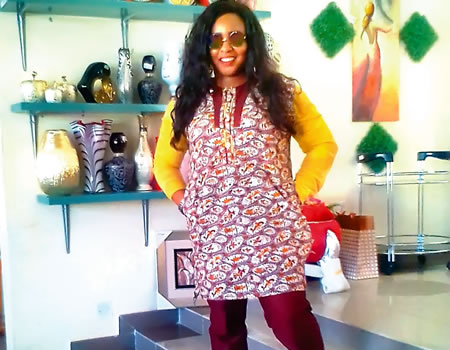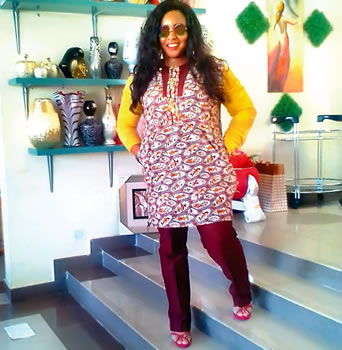Why did you abandon Law for fashion?
As a little girl, I particularly loved good clothes, shoes and bags. I would never see the kind of dress or shoes I appreciated in the market. My mum would often say to me in Igbo ” Chioma ife I na acho anaghi agba na afia” (Chioma what you want is not in the market). I was intrigued by the beautiful clothes an uncle sent to me from America. There was a glaring difference between those dresses and bags made in America and those tailored by my mum’s tailor. I was never satisfied with the finishing. Hence, I would continually question my mum why the clothes uncle gave me from America were neater and perfectly finished. Mom would always come to his defence stating obvious reasons why his end product could not be compared to the made in America dresses. I remember, now ever so vividly, how I was always so worried on why the made in Nigerian clothes are so different. Consequently, I vowed to bring about a reverse in this trend. My dream as a young girl was to see a girl in America buy and wear made in Nigeria. We have launched our e-commerce store zapelstore.com where people can shop made in Nigeria all over the world.I would say I was born with entrepreneurship in my genes. My dad was an entrepreneur and I have always loved to be independent. I ventured fully into fashion in 2006 but during my university days as a Law student at the University of Benin, I made some money making clothes for friends. I also registered as one of the first set of beauty representatives for House of Tara, and I took up make-up jobs in and outside Benin. Shortly after graduation, even before I left for Law school, I opened my first store from the money I saved from making clothes, doing make-up jobs and selling Tara make-up products. After law school, I went to a fashion school in England, Central Saint Martin’s London which is a world leading centre for art and design education. I wanted to learn from the best. There, I took courses in fashion designing, vintage bags and framed purses. My made in Nigeria story was birthed at a very young age. I have always believed that the economic growth and development of Nigeria is dependent on our ability to meet the basic material and non-material needs. Our national well-being is possible by creating a Nigerian society where our social, political, economic and cultural structures empower citizens. I have gone through several courses and I have tried to put in that extra effort to make my products of international export standard.
Why handbags?
I love good bags and good clothes. I think my love for bags also triggered this interest to take a course in bag making at Central Saint Martin’s London. More so, some of my clients then would always inquire if I could make matching bags with their fabrics. I remember an intimate friend once presented me with reasons why my bags would not sell. She argued that with the likes of Gucci and other big international brands, it would be a struggle. Her concern, strengthened my resolve, and it has continued to fuel my passion into pushing my made in Nigeria bags. When I came back from England after my training, I made some bag samples and they sold out. My dream, is to see my made in Nigeria bags gain international standard. It is interesting to note here that, today my friend now believe in made in Nigeria, as she sells our made in Nigeria garments in London.
What would you say should come into play when choosing a handbag to purchase?
When buying a bag, the occasion, must be put into consideration. You would need to determine if the bag would be for a party, work, or just for a casual day out. If you are drawn to a leather bag, then you ought to know the worth of what you are buying. It is important to mention here that some imported bags are made from cheap fake leather. If you want a durable leather bag, then my advice is that you could save up and buy a good genuine leather bag. Alternatively, you could go for fabric bags that are washable.
Do handbags have expiry dates? If yes, how is this determined?
Some handbags peel and shred after some time because the leather used is not genuine leather. They are synthetic leather. This could be termed as expired. Also exposing leather bags to heat and water can reduce its lifespan. Bags should be kept in a soft bag pack and in an airy room.
Seeing as many beauty items are first birthed abroad, the Nigerian handbag market seems to thrive more on imported items. How would you assess the reception to made-in-Nigeria items from your experience?
When I got back to Nigeria after my course, I did a market survey and test run. I made some bags, and sold them in some stores. Initially, the demand for my bags was slow. However, it later picked up. I noticed people started placing demand for several colours of my bags. I also ensured that my prices are affordable. I think Nigerians are gradually embracing ‘made in Nigeria products.’ This is for our own good and economic growth.
So, would you say Nigeria has what it takes to function appropriately on locally-made fashion items? Why?
The fashion industry is a billion dollar industry, America and China know this. We are yet to discover how important the fashion industry is to the economy. There was a time made in Nigeria goods were regarded as cheap and cheerful. But now entrepreneurs have started putting in more effort on the finished products to compete, and oust the imported products. Made in Nigeria has become a trend. Now, our clothes and bags are sought after internationally. I source locally, so recently, I went to Kano and Aba to source for leather and accessories for my bags. In Kano, I saw a leather factory which supplies leather to jimmy Choo and Louis Vuitton. I also saw a shutdown shoe factory with thousands of machines covered in dust. I asked questions, they said that electricity is the major cause of the closure of that shoe factory. I was deeply troubled, I imagined how many young people would have been gainfully employed if this factory was still functional. It’s not easy for entrepreneurs on this journey which I hash tagged #ourmadeinNigeriastory#. Power issue is a major problem. The government ought to uncover the real issues behind why we lack full access to steady electricity supply in this country. It is only when they deliver on that aspect that we can function 100% on locally made products. With poor power supply, good quality and export quantity is not guaranteed. For the betterment and growth of our country and economy, export should be our goal.
You May Also Like:
Nigerian designers seek establishment of Fashion Council
WATCH TOP VIDEOS FROM NIGERIAN TRIBUNE TV
- Relationship Hangout: Public vs Private Proposals – Which Truly Wins in Love?
- “No” Is a Complete Sentence: Why You Should Stop Feeling Guilty
- Relationship Hangout: Friendship Talk 2025 – How to Be a Good Friend & Big Questions on Friendship
- Police Overpower Armed Robbers in Ibadan After Fierce Struggle







